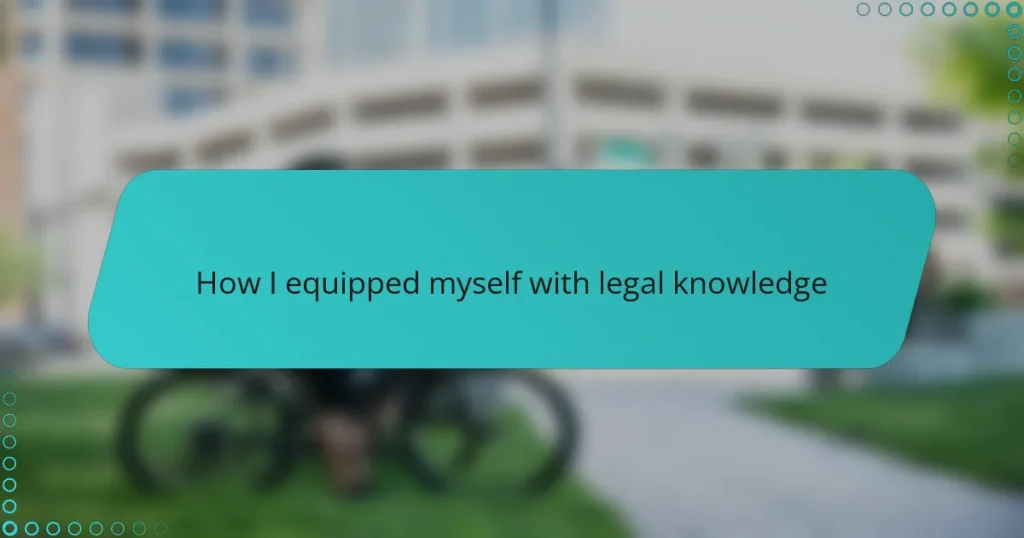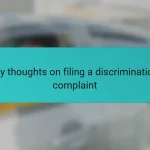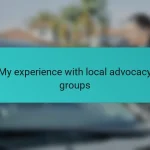Key takeaways
- Legal advocacy involves translating complex legal jargon into understandable terms, emphasizing the importance of empathy in the pursuit of justice.
- Essential legal concepts, such as “due process” and tenant rights, empower individuals to advocate for themselves effectively.
- Hands-on experience through volunteering and practical exercises is crucial for building confidence and developing real-world legal skills.
- Maintaining motivation and breaking down legal knowledge into manageable parts enhances the learning process and fosters personal growth.
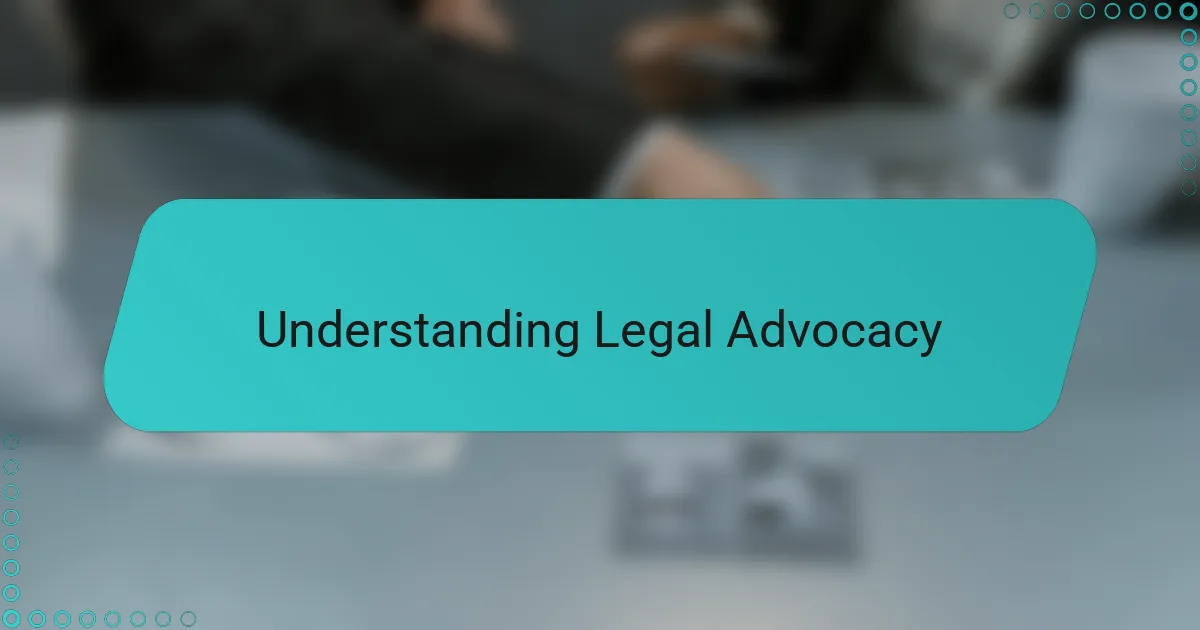
Understanding Legal Advocacy
Legal advocacy, to me, is more than just knowing laws—it’s about using that knowledge to stand up for others. I remember the first time I realized the power of advocacy: helping a friend navigate a confusing legal form opened my eyes to how crucial clear guidance can be.
Have you ever felt lost in a sea of legal jargon? That’s exactly what legal advocacy cuts through. It’s about translating complex rules into understandable terms and fighting to ensure fairness, especially when someone is vulnerable or unheard.
What truly struck me is how advocacy connects law with empathy. It’s not just about legal rights on paper but about people’s real lives and struggles. Understanding this helped me see my role not as a distant observer, but as an active participant in making justice accessible.
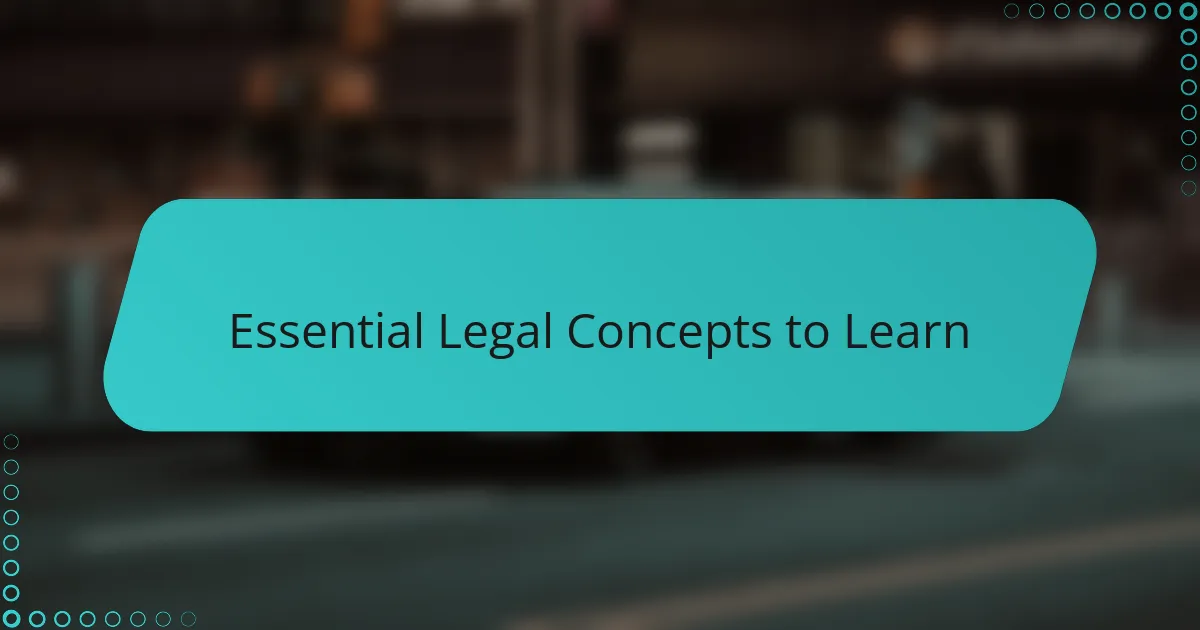
Essential Legal Concepts to Learn
Legal concepts like “due process” and “burden of proof” sounded intimidating at first, but diving into their meanings changed everything for me. I asked myself, how can I advocate effectively if I don’t grasp these basics? Learning these ideas gave me a sturdy foundation to understand how the legal system protects rights and ensures fairness.
One moment stands out when I helped draft a simple letter explaining “statute of limitations” to someone facing a deadline they didn’t know about. Seeing their relief made me realize how essential it is to break down these concepts into everyday language. That experience taught me that legal knowledge isn’t just academic—it’s practical and deeply human.
I often wonder, which legal concepts should everyone grasp to truly empower themselves? In my experience, understanding contracts, rights in criminal and civil cases, and how courts operate forms a toolkit that makes advocacy less abstract and more immediate. These ideas aren’t just rules—they’re keys to unlocking people’s ability to stand up for themselves.
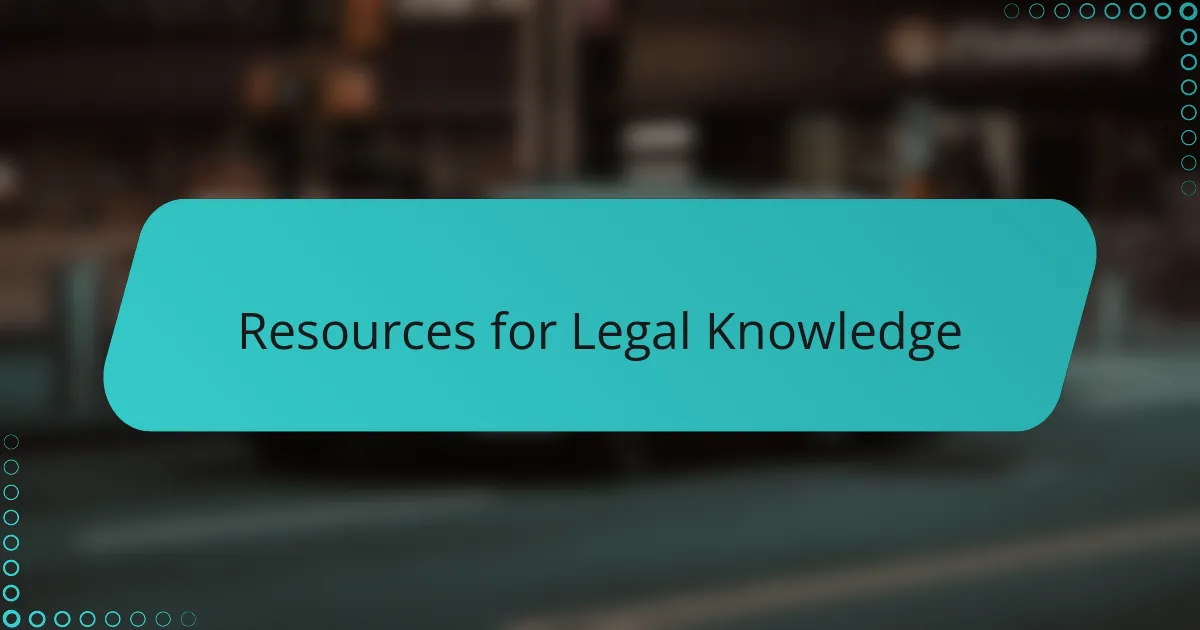
Resources for Legal Knowledge
Finding the right resources for legal knowledge felt like searching for a needle in a haystack at first. I started with books—basic guides written in plain language that didn’t drown me in jargon. Those early reads gave me confidence, proving that legal learning doesn’t have to be overwhelming if you pick the right materials.
Have you ever tried online courses or webinars? I did, and they were game-changers. The interactive format helped me ask questions in real time and hear different perspectives, which made abstract legal ideas click in a way reading alone couldn’t. Plus, staying current with free legal blogs and newsletters became my daily habit—small doses of info that accumulated into solid understanding.
One resource I’ve grown to trust above all is connecting with professionals—lawyers and advocates who generously share their time and experience. Those conversations often revealed nuances no textbook covered. When I reached out with my rookie questions, their encouragement reminded me that legal knowledge is a journey shared, not a solo sprint. Have you found mentoring to be just as valuable in your own learning path?
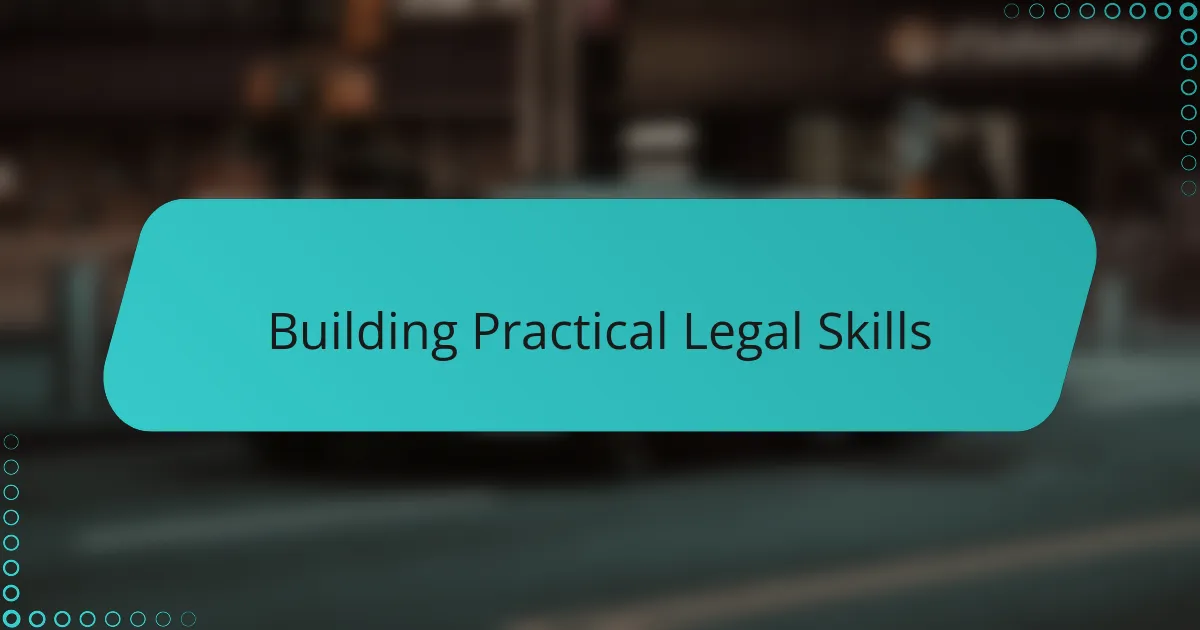
Building Practical Legal Skills
Building practical legal skills meant stepping beyond theory and diving into real-world application. I recall volunteering at a community legal clinic where drafting simple contracts and explaining rights to clients sharpened my ability to translate complex ideas into clear advice. Have you noticed how practice transforms abstract concepts into something tangible and empowering?
One challenge I faced was mastering legal research—it felt overwhelming initially. But breaking it down into focused searches and using trusted databases made me realize that efficient research is like piecing together a puzzle, revealing the bigger picture behind a case. This skill not only built my confidence but also allowed me to support advocacy with solid, up-to-date information.
Practicing oral advocacy was another game-changer. Preparing and presenting mock arguments pushed me to think quickly and communicate persuasively. I found that standing in front of others, even nervously, transformed my understanding of how law works in action. Have you ever experienced how speaking your case out loud clarifies your own thinking? For me, it was an invaluable step toward becoming an effective legal advocate.
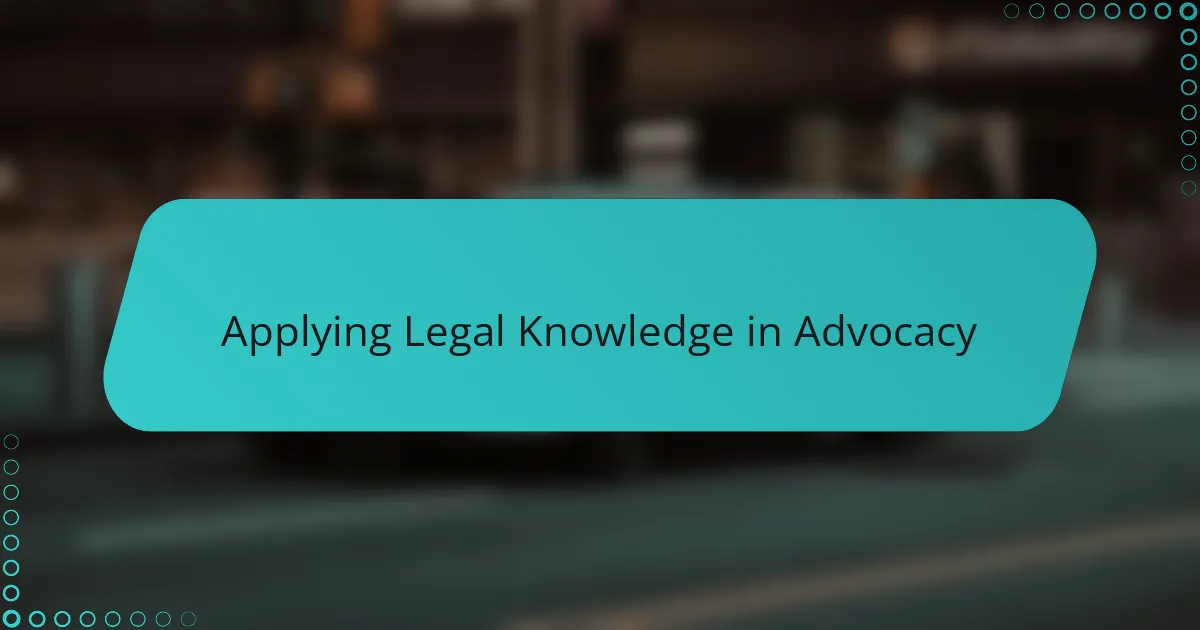
Applying Legal Knowledge in Advocacy
Applying legal knowledge in advocacy often means tailoring complex laws to the unique story of each person I represent. I remember a time when I had to simplify tenant rights for a client facing eviction; seeing their newfound confidence reminded me that knowledge truly empowers. Have you noticed how breaking down legal details into everyday language makes a world of difference for those who feel overwhelmed or unheard?
In practice, applying legal knowledge isn’t just about reciting statutes—it’s about strategy and creativity. When advocating for a marginalized group, I combined understanding of procedural rules with empathy to frame arguments that resonated beyond the courtroom. This balance between technical know-how and human insight has been crucial in turning legal theory into meaningful action.
But it’s not always straightforward. I’ve faced moments where the law seemed rigid or indifferent to real hardships. In those times, I asked myself: How can legal knowledge be a tool for justice, not just rules on paper? That question drives me to keep learning and adapt my approach, ensuring advocacy remains effective and compassionate.
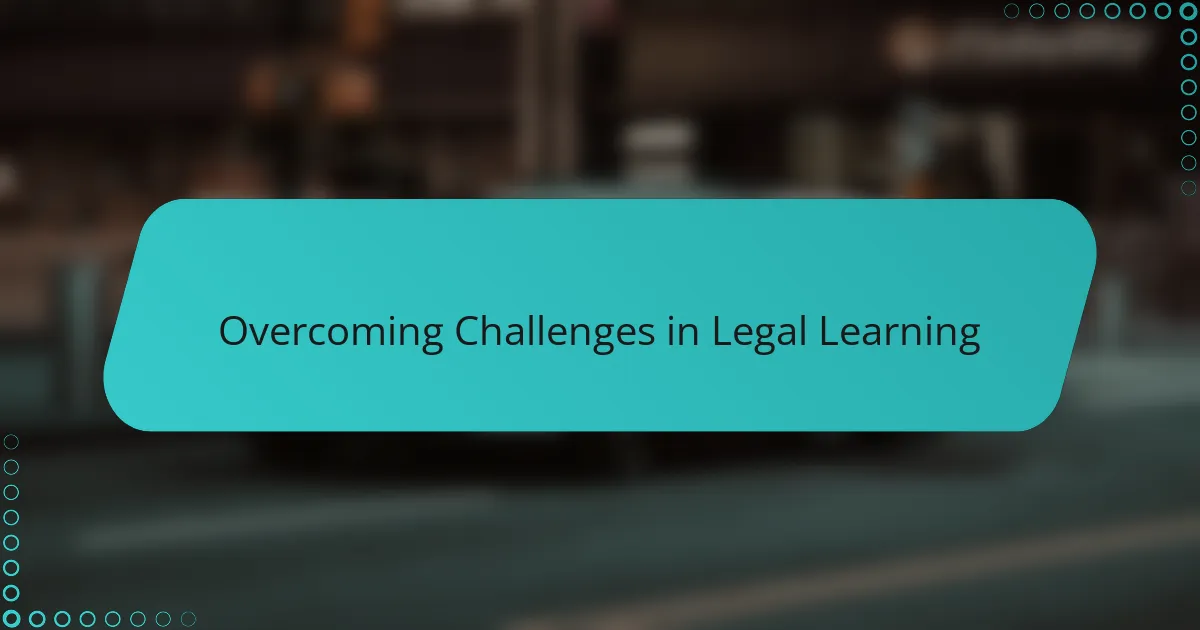
Overcoming Challenges in Legal Learning
Legal learning wasn’t always smooth sailing for me. I remember feeling overwhelmed by the sheer volume of information and the endless legal terminology that seemed impossible to master. Have you ever stared at a page full of legal text and wondered where to even begin? That feeling of being lost is normal, but what helped me was breaking everything down into smaller, manageable parts. Focusing on one concept at a time made the mountain feel more like a series of hills I could climb.
Another hurdle I faced was staying motivated when progress seemed slow. Legal studies demand patience and persistence, and there were moments I doubted myself. Yet, recalling why I wanted to advocate in the first place—helping people navigate justice—renewed my determination. Sometimes, I’d celebrate small wins, like understanding a tricky principle or successfully explaining it to someone else. Those moments reminded me that overcoming challenges isn’t about perfection; it’s about steady growth.
One of the toughest challenges was bridging the gap between theoretical knowledge and real-life application. I asked myself, how do I turn what I’ve learned from books into skills that actually make a difference? Volunteering at local clinics was a game-changer for me. It pushed me out of my comfort zone and forced me to apply what I knew in real conversations and situations. That experience taught me that facing challenges head-on not only builds knowledge but also builds confidence and empathy.
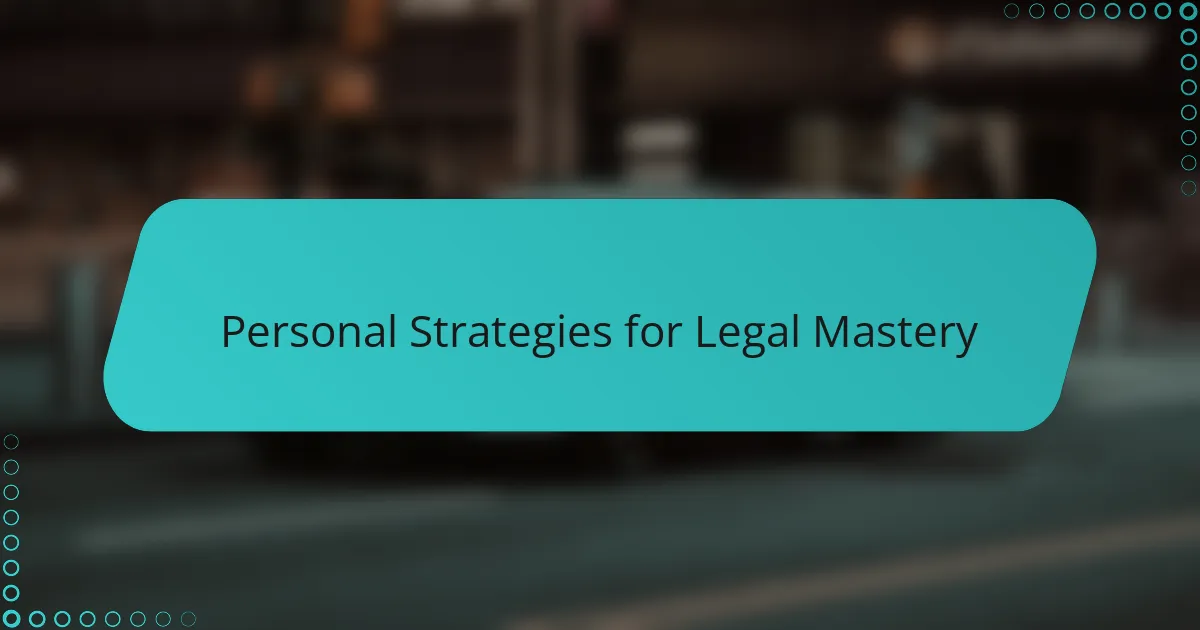
Personal Strategies for Legal Mastery
One approach I found invaluable was setting aside daily time for focused reading on specific legal topics. By treating legal study like learning a language—little by little each day—I avoided feeling overwhelmed. Have you ever tried breaking a big goal into tiny steps? For me, this made mastering complex ideas feel achievable and less daunting.
I also relied heavily on writing summaries of what I learned in my own words. This practice not only helped me clarify my understanding but transformed passive reading into active engagement. There was a moment when explaining “due process” in simple terms to a friend made me realize just how much deeper my grasp had become. Have you ever discovered that teaching others cements your own knowledge?
Lastly, I made a habit of reflecting on real cases or news stories through the lens of my growing legal knowledge. Connecting abstract concepts to actual events brought law to life in a way textbooks never could. It felt like piecing together a puzzle where theory met practice—a moment that motivated me to keep honing my skills day after day. How often do you find inspiration by linking learning to the real world?
